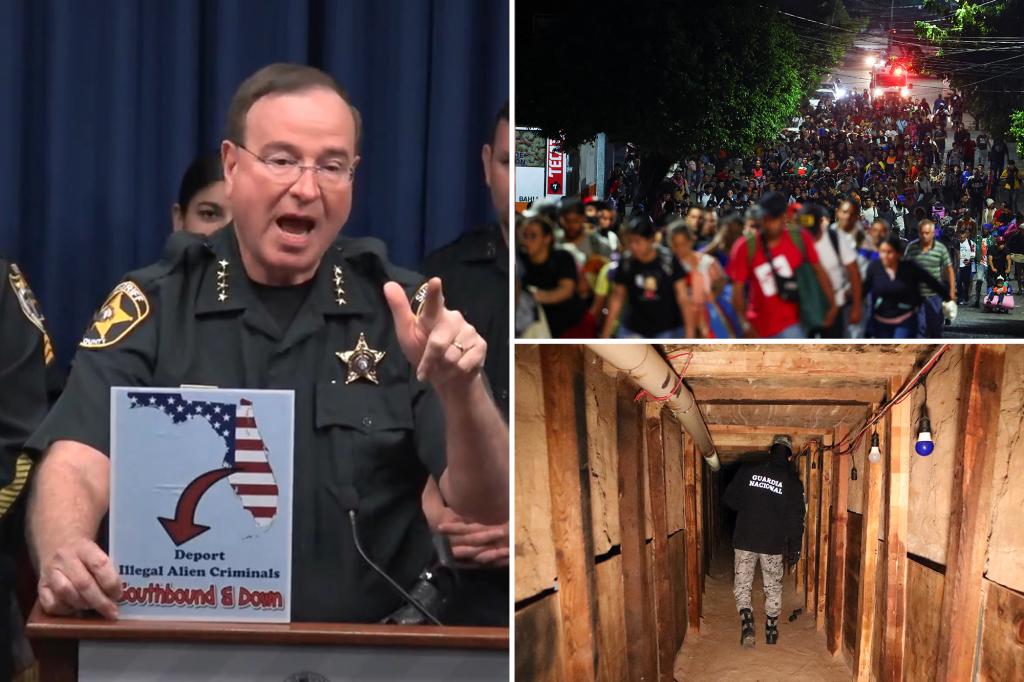Polk County Sheriff Grady Judd issued a stern warning to undocumented immigrants residing in Florida, urging them to “self-deport” to avoid potential imprisonment. This declaration, delivered during a press conference alongside Florida Governor Ron DeSantis and other officials, underscored a renewed focus on combating illegal immigration in anticipation of President Trump’s second term. Sheriff Judd linked illegal immigration to increased crime rates, citing specific instances of murder, DUI manslaughter, and organized theft allegedly committed by undocumented individuals. He emphasized the need for Florida to lead the nation in supporting President Trump’s immigration policies, portraying these measures as essential to protect the safety and well-being of Florida residents.
Governor DeSantis echoed Sheriff Judd’s sentiments, expressing confidence in the incoming Trump administration’s commitment to reversing the Biden administration’s immigration policies, which he characterized as contributing to a national crisis. DeSantis stressed the urgency of addressing illegal immigration, framing it as a crucial mission for Florida and the entire country. He highlighted Florida’s legal challenges against the Biden administration, including lawsuits contesting the “catch-and-release” border policy and the alleged failure to assist in removing non-citizens from voter rolls. These actions reflect DeSantis’s determination to actively combat illegal immigration through both legislative and legal avenues.
To further solidify his commitment to addressing illegal immigration, Governor DeSantis announced a special legislative session scheduled for the week following President Trump’s inauguration. This session will focus on securing funding for initiatives designed to curb illegal immigration, including measures for detention and relocation of undocumented individuals. DeSantis emphasized the importance of supporting President Trump’s immigration agenda and eliminating any perceived incentives that encourage illegal immigration into Florida. This collaborative approach between the governor and the incoming president aims to establish a unified front against illegal immigration.
Sheriff Judd’s blunt message, “Southbound and down,” underscores the hardline stance adopted by Florida officials towards undocumented immigrants. This rhetoric, combined with DeSantis’s proactive measures, signals a significant shift in immigration enforcement within the state. The special legislative session will likely focus on bolstering resources and implementing stricter policies to deter illegal immigration and address its perceived consequences. This concerted effort reflects a belief that a more stringent approach is necessary to address the complex challenges posed by illegal immigration.
The close alignment between Governor DeSantis and President Trump on immigration policy suggests a coordinated effort to enact substantial changes at both the state and federal levels. DeSantis’s public support for Trump’s immigration agenda, coupled with the timing of the special legislative session, indicates a strategic partnership to prioritize and accelerate immigration reform. This collaboration is likely to result in a more aggressive enforcement strategy and potentially new legislation aimed at restricting illegal immigration and increasing border security.
The focus on illegal immigration in Florida reflects a broader national debate regarding border security, immigration policy, and the integration of immigrant communities. While proponents of stricter enforcement argue that it is necessary to maintain public safety and protect national interests, critics express concerns about potential human rights violations and the economic impact of restricting immigration. The ongoing legal challenges and legislative initiatives in Florida will likely contribute to this national dialogue and shape the future direction of immigration policy in the United States. The interplay between state and federal actions will be crucial in determining the ultimate outcome of these efforts to address illegal immigration.

